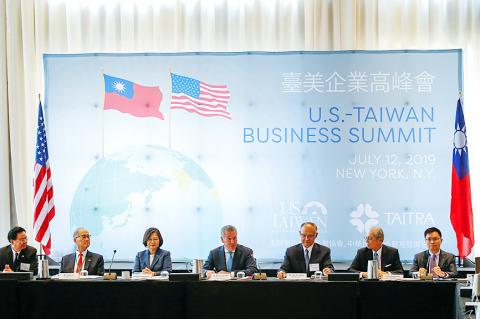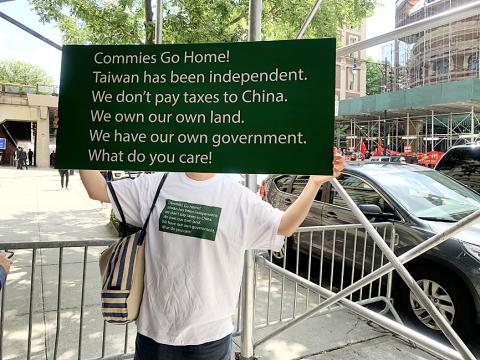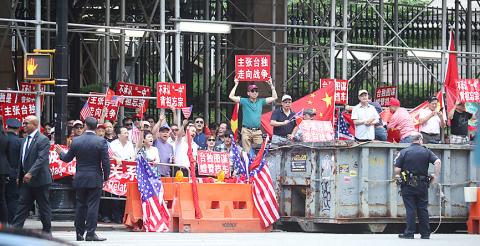President Tsai Ing-wen (蔡英文) on Friday delivered a speech at Columbia University during her closely watched visit to New York, calling for international support for a “free and democratic Taiwan” as the world faces growing threats from authoritarian forces.
“Today, a story of ‘change’ is exactly the story I am here to tell. It is the story of Taiwan. It is the story of how an island off the Chinese continent redefined the timeline for democratization and set the standard for transitioning democracies around the world,” Tsai said in a 16-minute speech at a closed-door event at the university, where she also conversed with political science professor Andrew Nathan and took questions from about 100 students.
Over the years, Taiwan has successfully defied skeptics who once questioned the sustainability of the nation’s democracy in China’s shadow, its economic potential and the likelihood of progressive values taking root in an East Asian society, she said.

Photo: Reuters
Today, Taiwan is home to a thriving democratic society and political system, and is the US’ 11th-largest trading partner, she added.
“I stand here before you as Taiwan’s first woman president, and this year we became the first country in Asia to legalize same-sex marriage,” Tsai said.
Taiwan nonetheless faces new challenges and its freedom faces a dire threat, Tsai said.

Photo: CNA
Citing the case of Hong Kong, where young people are taking to the streets to fight for democratic freedoms, she said that the territory’s experience under China’s “one country, two systems” model shows that authoritarianism and democracy cannot coexist.
“Given the opportunity, authoritarianism will smother even the faintest flicker of democracy. The process may be gradual, so subtle that most don’t even feel it,” Tsai said. “Before you know it, you feel some unseen force is monitoring your every move. You begin to censor your own speech, your own thoughts.”
“That is why, now more than ever, Taiwan’s story must be heard by the world,” she added.

Photo: CNA
Taiwan might be standing on the front lines against new threats to democracy unique to the information age, such as infiltration and cognitive warfare, which are challenges facing every nation today regardless of size, Tsai said.
Another challenge comes in the form of economic enticement with hidden strings attached, she added.
“Many countries around the world are being asked to choose between democracy and economic development, and it seems the right choice is becoming less clear by the day,” Tsai said.
However, democracy and economic growth are not only mutually beneficial, they are also irrevocably intertwined, she said.
“We have been able to successfully adapt to the challenges of the US-China trade war, not despite our democracy, but rather thanks to it,” Tsai said, adding that Taiwan’s democratic system makes it open to diverse ideas, giving it the flexibility to “break the mold when the mold no longer fits.”
Calling for international support for a “free and democratic Taiwan,” she said the nation’s survival involves more than just cross-strait relations, because it has been a vital bastion of democracy in the Indo-Pacific region.
Prior to her remarks at Colombia University, Tsai delivered a speech at the US-Taiwan Business Summit on trade relations between the two nations, which was also attended by NASDAQ chairman Michael Splinter and US-Taiwan Business Council president Rupert Hammond-Chambers.
Reaffirming the importance of bilateral trade ties, she said that facilitating Taiwan-US trade has been among her administration’s highest priorities, adding that the freedom of the Taiwanese market distinguishes the nation from its neighbors.
Although Taiwan has a population of just 23 million, the nation is the US’ 11th-biggest trade partner and is one the biggest buyers of US agricultural products per capita, Tsai said, adding that Taiwan’s information and communications technology supply chains are deeply integrated.
The economic and industrial ties between Taiwan and the US are closer than ever, and Taiwan is to announce a number of new deals in energy, one of the fastest-growing areas of bilateral cooperation, she said.
Taiwan would further expand and deepen its relationship with the US, as Taiwanese and US companies face many of the same challenges in the current trade environment, she added, citing the effects of changing supply chains in the information and communications technology sector.
Democratic Progressive Party Legislator Kuan Bi-ling (管碧玲), who attended the event, hailed the summit as a historic breakthrough for Taiwan’s diplomacy and a substantive boost to the growth of bilateral economic ties.
The summit’s importance was reflected in its attendees, such as Splinter, who presided over the summit, and representatives from a wide range of businesses, including BAE Systems, Lockheed Martin, Raytheon, Citigroup, Western Union, Northland Power, General Electric, Garmin and Gogoro, she said.
Friday was the second-to-last day of Tsai’s three-day layover in New York before heading to the Caribbean for state visits to four of Taiwan’s diplomatic allies.
She is to stop in Denver, Colorado, on the return leg of her trip.

The Taiwanese passport ranked 33rd in a global listing of passports by convenience this month, rising three places from last month’s ranking, but matching its position in January last year. The Henley Passport Index, an international ranking of passports by the number of designations its holder can travel to without a visa, showed that the Taiwan passport enables holders to travel to 139 countries and territories without a visa. Singapore’s passport was ranked the most powerful with visa-free access to 192 destinations out of 227, according to the index published on Tuesday by UK-based migration investment consultancy firm Henley and Partners. Japan’s and

NATIONAL SECURITY THREAT: An official said that Guan Guan’s comments had gone beyond the threshold of free speech, as she advocated for the destruction of the ROC China-born media influencer Guan Guan’s (關關) residency permit has been revoked for repeatedly posting pro-China content that threatens national security, the National Immigration Agency said yesterday. Guan Guan has said many controversial things in her videos posted to Douyin (抖音), including “the red flag will soon be painted all over Taiwan” and “Taiwan is an inseparable part of China,” while expressing hope for expedited “reunification.” The agency received multiple reports alleging that Guan Guan had advocated for armed reunification last year. After investigating, the agency last month issued a notice requiring her to appear and account for her actions. Guan Guan appeared as required,

Japan and the Philippines yesterday signed a defense pact that would allow the tax-free provision of ammunition, fuel, food and other necessities when their forces stage joint training to boost deterrence against China’s growing aggression in the region and to bolster their preparation for natural disasters. Japan has faced increasing political, trade and security tensions with China, which was angered by Japanese Prime Minister Sanae Takaichi’s remark that a Chinese attack on Taiwan would be a survival-threatening situation for Japan, triggering a military response. Japan and the Philippines have also had separate territorial conflicts with Beijing in the East and South China

A strong cold air mass is expected to arrive tonight, bringing a change in weather and a drop in temperature, the Central Weather Administration (CWA) said. The coldest time would be early on Thursday morning, with temperatures in some areas dipping as low as 8°C, it said. Daytime highs yesterday were 22°C to 24°C in northern and eastern Taiwan, and about 25°C to 28°C in the central and southern regions, it said. However, nighttime lows would dip to about 15°C to 16°C in central and northern Taiwan as well as the northeast, and 17°C to 19°C elsewhere, it said. Tropical Storm Nokaen, currently